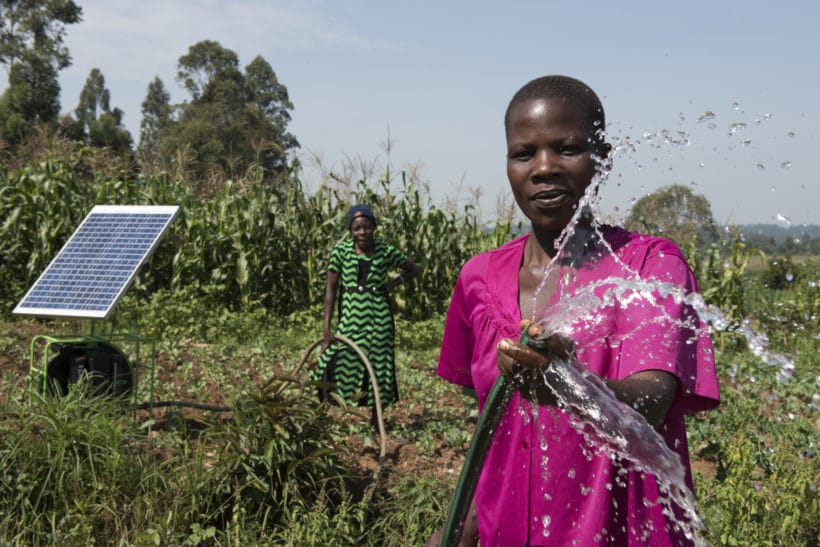
As Africa enters a critical decade, with the clock ticking on the UN’s Sustainable Development Goals for 2030, the multiple threats to the continent’s food, land and water systems are undermining efforts to reduce hunger, malnutrition and poverty.
The challenges Africa faces are increasingly connected to the rest of the world. History tells us that increased food insecurity can start and prolong wars, spark revolution and reverse economic development, all of which is made more likely by the impact of the pandemic, climate change and civil strife. Africa urgently needs a path forward that meets major threats to food, land and water systems with commensurate science, technology and innovation.
In a mutually beneficial manner, Africa is as important to CGIAR, the world’s largest publicly funded agricultural research partnership, as CGIAR is to Africa. For more than five decades, CGIAR has made huge contributions to shaping the science behind Africa’s agricultural development. The institutional reforms and the strengthening of Africa’s research capacities over the same timeframe have been phenomenal.
While Africa may appear to be losing ground in meeting its targets for food and nutrition security, the current scenario would be far more desperate without the impact and influence of CGIAR. Breakthroughs in upstream science including genetics, agronomy and environmental and resource management are helping farming communities better cope with today’s extreme conditions and unpredictability.
To build on this life-saving legacy and stay relevant to an Africa facing new and ever more complex challenges, CGIAR must continue to evolve. The transition to One CGIAR is a once-in-a-generation opportunity to transform CGIAR so it can deliver the science and innovations needed to build a food-secure future in Africa and beyond. There is an absolute necessity to continuously counter known and unknown shocks to the agrifood system whenever they are encountered. Farmers and all stakeholders must remain equipped with appropriate technologies and policy instruments to meet these challenges head on. The One CGIAR transition offers such clear benefits in reducing biotic and abiotic stressors.
From an organizational change point of view, integrating CGIAR’s governance into a more unified system provides a single entry-point for engagement and clear mechanisms to respond to locally relevant opportunities, priorities and needs – something long demanded by funders and country partners alike. In this context, while research and innovation work is carried out, as before, in a decentralized way, administration and management become streamlined in a way that engenders efficiency of resource utilization. In addition, the One CGIAR transition also aims to double current funding, unlocking more investment for its work and partners in priority regions, half of which cover Africa. In 2021, close to USD$1 billion was pledged to CGIAR by funders, a major vote of confidence in the reform.
At the same time, the drivers of Africa’s food insecurity are multi-dimensional, which means that understanding the specificities of Africa is crucial for the successful implementation, application and unpacking of the One CGIAR reform in Africa. With around half of the countries in which CGIAR works in Africa and with four One CGIAR research centres headquartered on the continent, One CGIAR can only be a success if it is a success in and for Africa.
Transformational change on the scale needed can only be delivered in the context of transdisciplinary partnerships with national, regional research and donor partners. With this in mind, the African Development Bank (AfDB) and FARA recently brought together the African Union Commission, regional economic communities (RECs) and representatives of agricultural research for development institutes, with CGIAR, at a meeting in Abidjan to ensure that the necessary One CGIAR reforms reflect the needs of African farmers.
In the space between the Abidjan meeting and high-level consultations planned in Dakar in May, there is great hope for the elaboration of a consensus position on the direction for food science and innovation coordinated by the African Union Commission, AfDB and FARA as part of ongoing consultations, CGIAR can move forward in its reforms with confidence.
Transforming Africa’s food systems can only be achieved as a joint effort. That is why CGIAR is embracing the opportunity and invitation to boost its engagement with its country and regional partners. Its leadership is committed to ensuring that the perspectives of all its partners are meaningfully reflected in the One CGIAR transition and future, leveraging shared history and relationships to respectfully build on the important legacy of the first fifty years.
Ultimately, people do not survive on MoUs or partner agreements, they survive on functioning food systems that provide safe, sustainable and equitable diets and livelihoods. As leading agricultural research organisations, whose success depends on country and regional partnerships, CGIAR and FARA are unwavering in their pursuit of a united and successful way forward for Africa.
Dr. Yemi Akinbamijo, Executive Director of the Forum for Agricultural Research in Africa (FARA)
Dr. Claudia Sadoff, Managing Director, Research Delivery and Impact of the CGIAR System Organization (CGIAR)